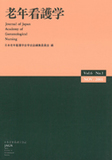Japanese
English
- 販売していません
- Abstract 文献概要
- 参考文献 Reference
本研究の目的は,老人保健施設入居者とデイケア利用者を対象にメタ記憶の分析を行い,高齢者の記憶に対する認識と抑うつ感との関係・特徴を明らかにすることである.117名(M = 83.1±6.17歳)の老人保健施設入所者と,85名(M = 78.9±6.32歳)のデイケア利用者を対象に,面接調査によってMini Mental State Exam,Geriatric Depression Scale,Health Scale,Metamemory in Adulthood Questionnaireの測定を行った.本研究の結果から,年齢,抑うつ感,居住環境など,異なる施設利用者の特性が高齢者のメタ記憶に影響を与えていることが示された.また,高齢者の記憶に対する主観的な評価は,施設の違いにかかわらず個人の中では一貫性と整合性が保たれていることが明らかとなった.記憶の維持と改善に向けたアプローチでは,居住空間や利用施設など,それぞれに所属する高齢者の特性に合わせた独自のアプローチが必要であること,また記憶に対する主観的な評価を高める働きかけと,そのための環境調整が重要であることが示唆された.
This study compared metamemory, depression and cognitive function of Japanese geriatric nursing facility residents(n = 117, M = 83.1 ± 6.17 y.o.)and daycare attendees(n = 85, M = 78.9 ± 6.32 y.o.). In face-to-face interviews, participants were administered the Mini Mental State Exam, Geriatric Depression Scale, Health Scale, and the Metamemory in Adulthood Questionnaire. The findings indicated that the memory complaints among Japanese elders vary by living arrangement. The memory complaints are usually incongruous with objective evaluation; however, the findings also indicated that the self-evaluation memory among Japanese elders was consistent in them. The results were suggesting that different approaches for Japanese elders based on their age, the level of depression and the type of living arrangement were important in order to provide appropriate program for maintaining and improving their memory.
Copyright © 2001, Japan Academy of Gerontological Nursing All rights reserved.


